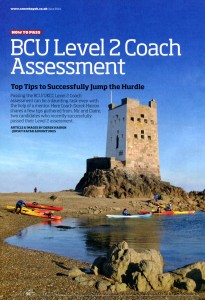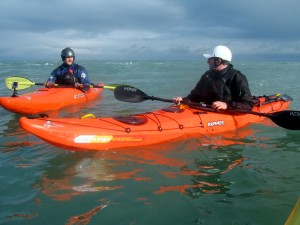How to Pass the Kayak Coach Assessment
British Canoeing Coach Assessment – Top Tips to Successfully Jump the Hurdle
From 2018 the British Canoeing level 2 coach award is called the Coach award. These top tips to pass your kayak coach assessment remain equally valid today.
Passing the British Canoeing Coach assessment can be a daunting task even with the help of a mentor. Here are a few tips gathered from Nic and Clare who successfully passed their Coach Level 2 assessment.
If you’re not familiar with the British Canoeing coaching scheme, it’s best to look at this page. When you have got confused get in touch with me – or a Coach trainer/assessor – for advice and clarification!
Basically you can now directly sign up for the coach training course providing you have the paddlesport skills and experience. You do not need to have completed the BC Level 1 paddlepsort coach course. Personally, I’d advise you to be around BC 3 star level before you do the core training module.
Why bother with the Coach assessment?
The Coach award allows you to operate in defined areas without supervision. More importantly, if you already have the Sea kayak leader award and complete the sea kayak module you will increase your operating limits considerably.
Top Tips to help you pass your Coach assessment
-
Develop your personal paddle skills up to a good standard so you no longer have to think about them. You’ll then be able to focus on your students more easily.
- Get plenty of time afloat developing your own skills in a wide range of conditions so you build up your experience. This is a good excuse to just get out paddling with your friends.
- Help out at your local club/youth group or centre. This will give you more opportunities to practice your coaching skills.
- Try to coach as wide a range of people as possible to develop your toolbox of coaching styles. There is a big difference between coaching young people and adults.
- Learn from other coaches. Spend time assisting on their sessions.
- Keep your log book up to date and record anything related to paddlesport.
- Work in different types of craft. This will remind you what it feels like when doing a skill for the first time.
- You can be assessed in just one discipline e.g sheltered water, sea kayak coach – you’ll need sea kayak leader award for this-, sea kayak coach advanced water – you’ll need the advanced sea kayak leader award, surf kayak coach etc.
- Stay in contact with other trainees on you Coach training course and also the course providers. Both can provide support and advice as well as top tips. There are also a couple of Facebook pages in existence.
- Allow time to get any pre-requisites.
- It’s worth doing a 16 hour first aid course rather than an 8 hour one because it is more comprehensive and will be more useful in the future, e.g. if you go on to do 4 Star Leader assessment.
- Get a mentor who can give advice and also help you prepare your portfolio of experience for the assessment.
- Plan, do and review your coaching sessions. Write them up soon after the session while things are still fresh in your mind.
- If there are others in your area needing assessment, consider hiring an assessor rather than book onto an assessment course. This will allow you to – hopefully – coach students who you have been working with over a length of time. It makes things more realistic and less stressful.
If you are a level 1 coach stepping up a grade to the Coach award, this will enhance your paddle-sport and coaching skills as well as helping you find employment in the adventure industry. Clare and Nic subsequently passed their level coach award and headed south to kayak and find work in New Zealand.
Minor updates to reflect the changes in the Coach training course were made in Dec 2017.
This article was originally published in Canoe Kayak Magazine


